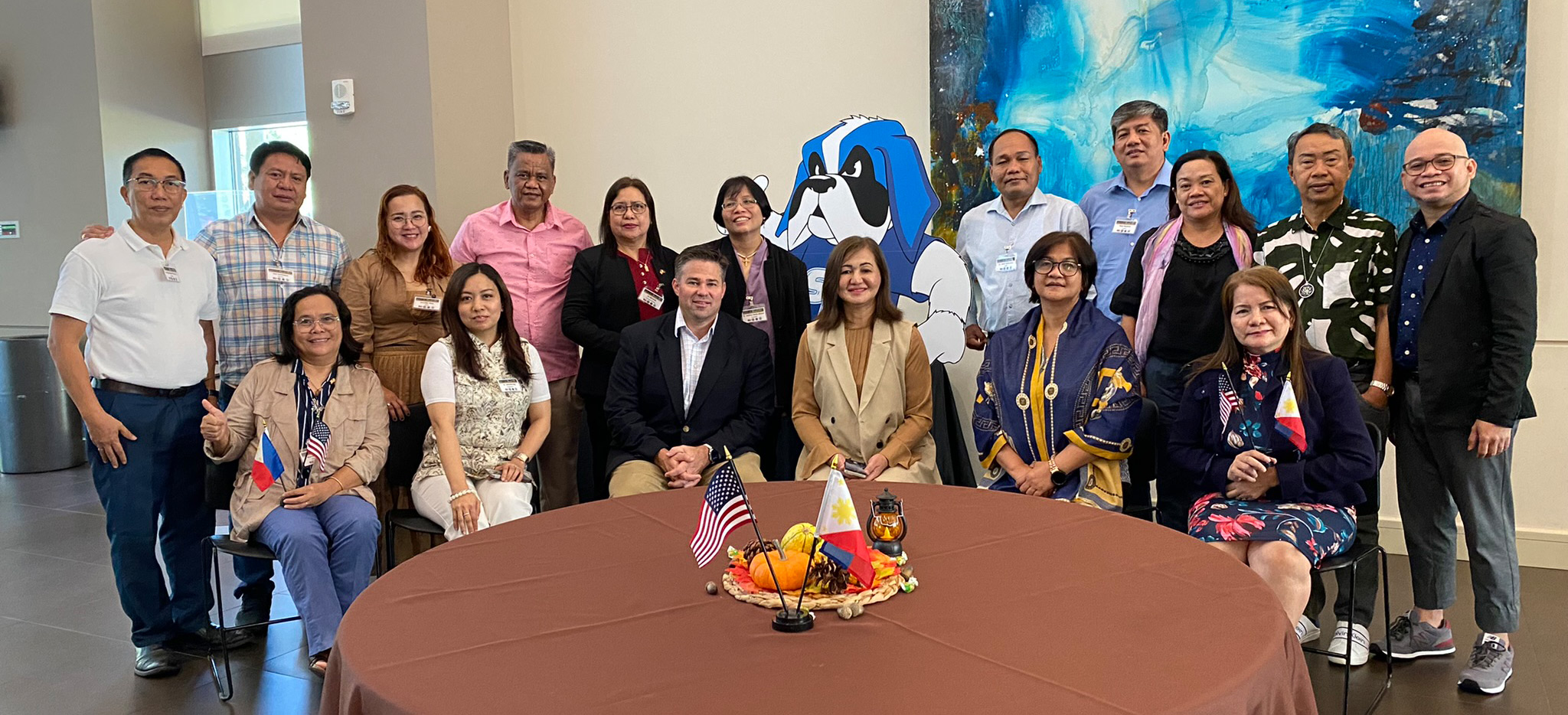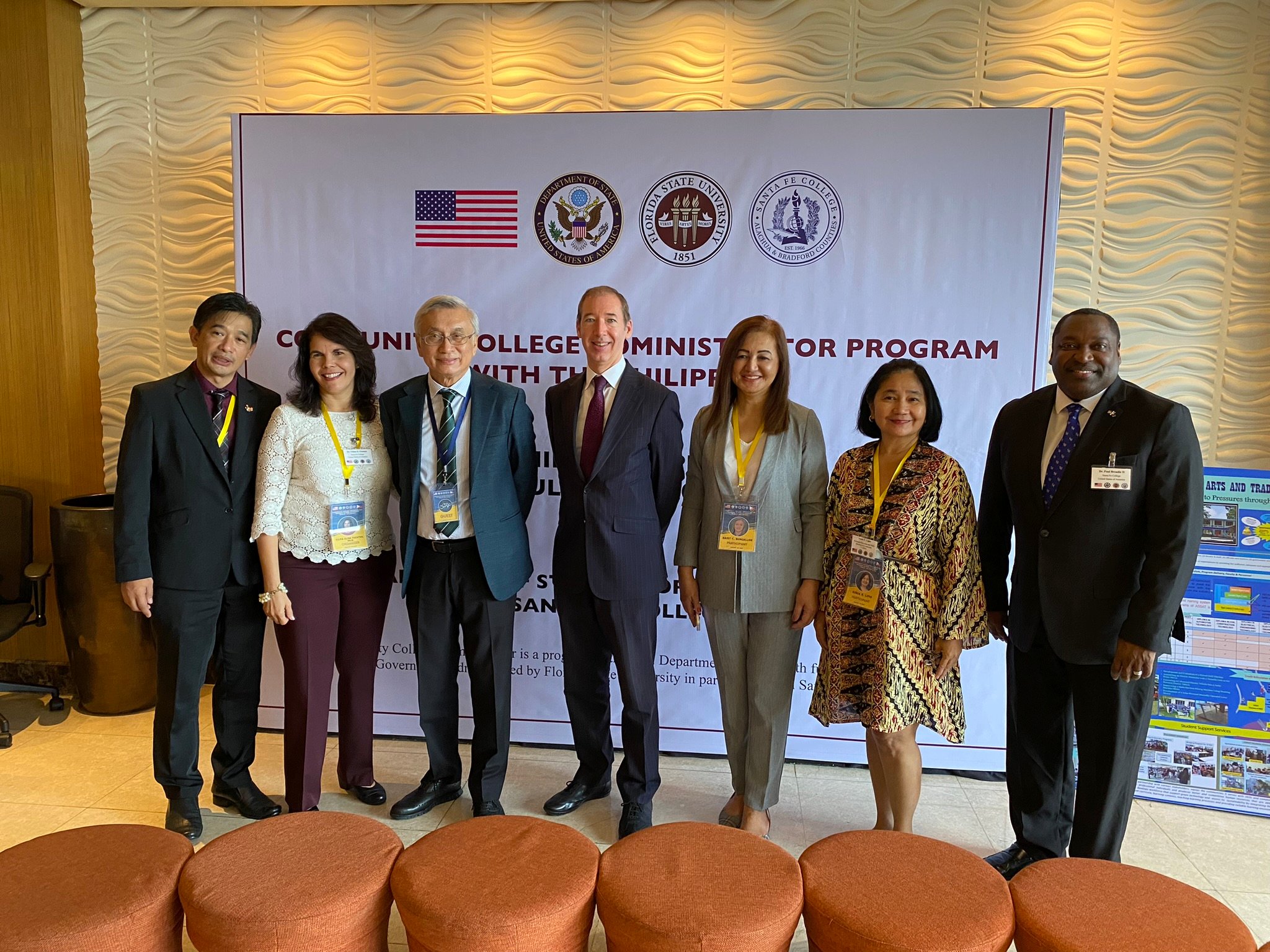Philippines
Overview
 Santa Fe College hosted a delegation of sixteen higher education administrators from
the Philippines on October 31 - November 11, 2022 as part of a six-week Community
College Administrator Program (CCAP) funded by the United States Department of State.
The CCAP is administered by Florida State University's Learning Systems Institute(Opens in new window) with Santa Fe College as the lead community college partner. The program was implemented
as part of a broader bilateral celebration of 75 years of diplomatic relations between
the United States of America and the Republic of the Philippines.
Santa Fe College hosted a delegation of sixteen higher education administrators from
the Philippines on October 31 - November 11, 2022 as part of a six-week Community
College Administrator Program (CCAP) funded by the United States Department of State.
The CCAP is administered by Florida State University's Learning Systems Institute(Opens in new window) with Santa Fe College as the lead community college partner. The program was implemented
as part of a broader bilateral celebration of 75 years of diplomatic relations between
the United States of America and the Republic of the Philippines.
The Philippines is an archipelago comprised of over 117 million people who speak different languages and celebrate diverse cultural traditions. Although nearly 80% of Filipinos identify as Catholics, the country has a sizeable Muslim population that inhabits the southern islands of Mindanao, Palawan, and Sulu. Other religious groups comprise a little over 10% of the country.
Colonialism has left an indelible mark on Filipino culture and education. The country was colonized by Spain for nearly 300 years. The Spanish imprint can still be seen in the country's dominant religion, traditional dances, and popular words. Filipinos declared their independence in 1898 but was occupied by the United States after the Spanish-American War. Americans introduced the first mass, public education system in the country in 1901 and have supported the development of public education since then. After falling under Japanese occupation from 1942-1945, Filipinos fought for and finally gained their independence in 1945. They have maintained strong bilateral relations with the United States since then. Today, English is taught in all public schools and remains the lengua franca in the country.
 The visiting Filipino delegation included presidents from locally-controlled universities
representing the Commission on Higher Education (CHED), regional directors from the
Technical Education and Skills Development Authority (TESDA), and administrators from
private higher education institutions. Their goal was to learn more the about the
U.S. community college system. They studied the governance, financial structure, academic
programs, student services, and public-private partnerships that form part of our
college. They also explored the varied ways that technology was used to make data-informed
decisions, support program assessment, engage the community, and provide high quality
educational programs.
The visiting Filipino delegation included presidents from locally-controlled universities
representing the Commission on Higher Education (CHED), regional directors from the
Technical Education and Skills Development Authority (TESDA), and administrators from
private higher education institutions. Their goal was to learn more the about the
U.S. community college system. They studied the governance, financial structure, academic
programs, student services, and public-private partnerships that form part of our
college. They also explored the varied ways that technology was used to make data-informed
decisions, support program assessment, engage the community, and provide high quality
educational programs.
Visiting Filipino higher education leaders engaged various members of the Santa Fe College community during their time in Gainesville. They met student government leaders on several occasions. They also delivered a presentation to the Student Senate to explain their country's cultural and geographic diversity as well as its historic relationship to the United States.
The final week of the CCAP was held in Manila in July 2023. Santa Fe College President, Dr. Paul Broadie, and Assistant Vice President for Academic Affairs, Dr. Vilma Fuentes, participated in this high-level meeting. At its conclusion, Dr. Broadie signed a new memorandum of understanding with CCAP Aluma, Dr. Aminah April Alcazar, president of Urdaneta City University(Opens in new window). Faculty and students from both institutions continue to engage each other through virtual exchange programs, thus helping to advance mutual understanding and respect among Filipinos and Americans. You can read more about the program and the subsequent signing of an MOU through this press release(Opens in new window) issued by the U.S. Embassy in the Philippines.

The Community College Administrator Program (CCAP) is sponsored by the U.S. Department of State(Opens in new window) with funding provided by the U.S. Government and administered by Florida State University and Santa Fe College.